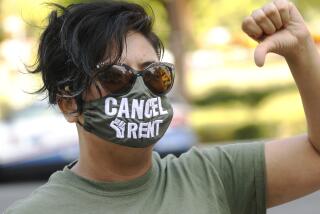She Takes a Deep Breath and Explains New Smoking Curbs
- Share via
A pile of pink message slips greeted law clerk Maria Brimsey when she arrived at the Los Angeles city attorney’s office at 8:30 a.m. Monday, the first workday affected by the city’s tough new anti-smoking ordinance.
The city attorney’s 485-2108 hot line for information on the 2-day-old law had actually been ringing off the hook since 7 a.m., and Brimsey was the only one assigned to handle all the questions.
By late afternoon, the 26-year-old clerk, a nonsmoker, had fielded more than 200 calls. Many were from employers checking on whether their new smoking policies, now required to be put in writing, complied with the ordinance.
“Smoking is prohibited in restrooms, elevators, medical facilities,” Brimsey kept repeating. After a while, she was no longer reading from a copy of the law on her desk.
“I’ve repeated it so many times, I know it by heart,” she said.
The law also says that two-thirds of all lounge areas, cafeterias and lunchrooms must be smoke-free. It also requires businesses with five or more employees to provide “to the maximum extent possible” a smoke-free work area for employees who want one.
As the day wore on, most of the calls were coming from workers, Brimsey said. Among them was a typist whose employer had prohibited all smoking in the work area, which is an option under the new law.
“She was very angry,” Brimsey said. “She complained she could smoke only if she went outside. But if she went outside too often, he’d say she wasn’t working.”
About half a dozen callers, she added, had complaints that she passed on to city attorney hearing officers for review.
Bruce Coplen, the deputy city attorney who developed the enforcement procedures, said he expected most problems could be resolved through city attorney hearings, which are similar to mediations.
A number of workers interviewed said that the new law had no immediate effect in their offices, either because smokers and nonsmokers have already learned to accommodate each other or because some large companies had instituted their own policies in previous weeks.
Other comments focused on a key provision of the new law: the fact that the burden to establish nonsmoking areas in the workplace falls on nonsmoking employees, who must request their employer to take action.
Lina Rosholt, a nonsmoker who sits between two smokers, said she doubted that she or other fellow nonsmokers would press for segregated seating at the mid-Wilshire insurance agency where she is employed.
Such a change would be made “if we raised a stink,” she said.
“But there isn’t any big problem,” with the exception of another nonsmoking employee “who has a lot of trouble” with smokers, Rosholt said. “People aren’t complaining, although personally, I wish everyone would quit smoking.”
One of Rosholt’s co-workers who smokes, Churchill Carmalt, said he is “basically not very concerned” about the new law.
“If I had to give it up, I could quit smoking at the office,” he said.
Another nonsmoker echoed that spirit of compromise when asked if nonsmokers would press for changes in her office.
“As long as they don’t blow it in my face, I’m fine,” she said.
Karen Allan, a nonsmoking secretary in a law firm, said no adjustments had been made in her office. But she expects that nonsmokers will begin complaining if smokers do not comply with new restrictions against smoking in the company’s elevators and bathrooms.
“I think the law was a good idea,” she said.
According to the law, individual violations of the law will be considered infractions and handled with police citations, much like traffic tickets, Coplen said.
Violations by employers, such as retaliation against a nonsmoking employee, are misdemeanors, resulting in either a hearing once a complaint is filed with the city attorney’s office, or a prosecution, which is punishable by a $500 fine, six months in jail or both, he said.
More to Read
Sign up for Essential California
The most important California stories and recommendations in your inbox every morning.
You may occasionally receive promotional content from the Los Angeles Times.









